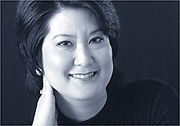Advertisement - Click to support our sponsors.


Changing Hawaii
THEY say you can't really appreciate your parents until becoming a parent yourself. If that's true, maybe you can't treasure your ethnic heritage without visiting your native homeland. Proud to be
FilipinoThat's certainly the case with Jenny Duhaylonsod of Moiliili.
Two months ago -- while some Hawaii residents toiled in summer
school and others flew off to enjoy exotic, far-off destinations for the first time -- Jenny managed to do both simultaneously.
The Ewa-born, third-generation Filipino American spent five weeks in the Philippines, visiting Baguio, Pangasinan, Subic Bay and other locales.
She was one of seven U.S. college students who each paid $2,540 to enroll and travel as part of a three-credit course at the University of Hawaii at Manoa called "Summer Field Studies in the Philippines."
Organized and taught by UH ethnic studies professor Dean Alegado, the class enlightened Jenny on the history, politics and economic development of the Philippines.
It also infused her with a profound love and respect for her roots.
"In Hawaii, I always considered myself to be 'local.' I was never much into the culture before," Jenny admits. "But now I feel really proud to be a Filipino American."
Her adventure began on July 8, when she, Professor Alegado and six Filipino-American students from the mainland embarked for Manila.
First on the agenda was an international Philippine studies conference at the University of the Philippines-Diliman in Quezon City.
Happily, it was like old home week for the Hawaii contingent, since they met other island representatives also in attendance including Belinda Aquino of the UH Center for Philippine Studies and Alice Mak, who oversees the Asian collection at Hamilton Library.
Three weeks were spent at the University of the Philippines-Baguio, where the classmates discussed the socio-economic development and history of the northern region, the cultural minorities of the Cordilleras and their struggle for ancestral lands (shades of Hawaiian sovereignty!), and the consequences of Ilocano out-migration.
On the weekends, there were trips to Ilocos Sur, Ilocos Norte and Banaue, home of the world-famous natural wonder, the rice terraces. "It was like a giant had come and cut steps right into the mountains," Jenny remembers with admiration.
Their final stop was Olongapo, Alegado's hometown, where the students interacted with residents before returning to Manila and Honolulu.
WHEN it was time to say aloha, overwhelming emotion engulfed the seven university students.
They unashamedly cried and hugged at the airport -- elated that they had learned about their heritage together, yet melancholy they may never meet again.
Even now, Jenny -- who just graduated with a bachelor's degree in journalism -- gets teary on relating what she reaped from the intensive UH summer course. Foremost was a deep gratitude for her grandparents, who came from Siquijor in the Visayas before the 1920s.
"I feel both happy and sad that they had to sacrifice so much to give their children a better life here," she says. "I hope my kids can go with me to the Philippines one day, so they can appreciate that, too."
Diane Yukihiro Chang's column runs Monday and Friday.
She can be reached by phone at 525-8607, via e-mail at
dchang@starbulletin.com, or by fax at 523-7863.